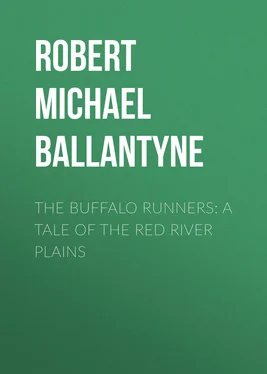Robert Michael Ballantyne - The Buffalo Runners - A Tale of the Red River Plains
Здесь есть возможность читать онлайн «Robert Michael Ballantyne - The Buffalo Runners - A Tale of the Red River Plains» — ознакомительный отрывок электронной книги совершенно бесплатно, а после прочтения отрывка купить полную версию. В некоторых случаях можно слушать аудио, скачать через торрент в формате fb2 и присутствует краткое содержание. Жанр: Детские приключения, literature_19, foreign_antique, foreign_prose, foreign_children, на английском языке. Описание произведения, (предисловие) а так же отзывы посетителей доступны на портале библиотеки ЛибКат.
- Название:The Buffalo Runners: A Tale of the Red River Plains
- Автор:
- Жанр:
- Год:неизвестен
- ISBN:нет данных
- Рейтинг книги:5 / 5. Голосов: 1
-
Избранное:Добавить в избранное
- Отзывы:
-
Ваша оценка:
- 100
- 1
- 2
- 3
- 4
- 5
The Buffalo Runners: A Tale of the Red River Plains: краткое содержание, описание и аннотация
Предлагаем к чтению аннотацию, описание, краткое содержание или предисловие (зависит от того, что написал сам автор книги «The Buffalo Runners: A Tale of the Red River Plains»). Если вы не нашли необходимую информацию о книге — напишите в комментариях, мы постараемся отыскать её.
The Buffalo Runners: A Tale of the Red River Plains — читать онлайн ознакомительный отрывок
Ниже представлен текст книги, разбитый по страницам. Система сохранения места последней прочитанной страницы, позволяет с удобством читать онлайн бесплатно книгу «The Buffalo Runners: A Tale of the Red River Plains», без необходимости каждый раз заново искать на чём Вы остановились. Поставьте закладку, и сможете в любой момент перейти на страницу, на которой закончили чтение.
Интервал:
Закладка:
“A trip to the plains requires more than powder and shot,” said the store-keeper; “where will you be goin’ to get a horse an’ cart? for you can hev mine no longer.”
“Dechamp, he promise to sole me a horse, an’ Mrs Davis’n will loan me a cart,” returned the half-breed, with lofty independence.
“Hm! an’ you will be returnin’ the cart an’ payin’ for the horse when the hunt is over, I suppose?”
Yes, that was exactly the idea that was in La Certe’s brain, and which, he hoped and fully expected, to reduce to practice in course of time—if Duncan McKay would only assist him by making him a few advances at that present time.
“Well, what do you want?” asked McKay, getting off the bath.
The half-breed wanted a good many things. As he was going off in the course of a few days, and might not be able to return for a long time, he might as well take with him even a few things that he did not absolutely need at the moment. Of course he wanted a good supply of powder, shot, and ball. Without that little or nothing could be done. Then a new axe, as his old one was much worn—the steel almost gone—and it was well-known that a trapper without an axe was a very helpless creature. A tin kettle was, of course, an absolute necessity; and the only one he possessed had a small hole in it. A few awls to enable him to mend his bark canoe when open water came, and a couple of steel traps, some gun-flints, and, O yes, he had almost forgotten a most essential thing—twine to make a net, and some fish-hooks.
“It iss a regular outfit you will be wanting,” remarked the store-keeper, as he handed over the various articles.
O no—not a regular one—only a very little one, considering the length of time he should be away, and the wealth with which he would return. But again he suddenly remembered that he had forgotten something else.
“Well, what iss it?”
Some glover’s needles and sinews for making leather coats and moccasins. Needles and thread and scissors, for it was quite clear that people could not live without suitable clothing. A new capote, also, and—and—a yard or two of scarlet cloth with a few beads.
As he made the last request, La Certe attempted to speak insinuatingly, and to look humble.
“Come, that iss pure extravagance,” said McKay, remonstrating.
La Certe could not, dare not, face his wife without these articles. He pleaded earnestly. “Slowfoot is so clever wi’ the needle,” he said. “See! she send you a pair of moccasins.”
The wily man here drew from the breast of his capote a pair of beautifully made moccasins, soft as chamois leather, and richly ornamented with dyed quills of the porcupine.
McKay laughed; nevertheless he swallowed the bait and was pleased. He finally handed the goods to La Certe, who, when he had obtained all that he could possibly squeeze out of the store-keeper, bundled up the whole, made many solemn protestations of gratitude and honest intentions, and went off to cheer Slowfoot with the news of his success.
It chanced that Antoine Dechamp, the very man about whom he had been talking to Duncan McKay, had dropped in to see him and his spouse, and was sitting beside the fire smoking when he entered. Displaying his possessions with much pride, he assured Dechamp that he had paid for the whole outfit, and meant to return in the spring a rich man with means enough to buy a horse and cart, and start with the buffalo-hunters for the plains.
“You have a horse to sell—they say?” he remarked to his friend in a careless way.
“Yes—and a good one too,” answered Dechamp.
“Well, if you will loan him to me in the spring, I will pay for him when I come back. It takes all I have to fit me out to start, you see.”
Dechamp did not quite see his way to that—but there was plenty of time to think over it!
“Have you heard,” said Dechamp, willing to change the subject, “there is some talk that Perrin has been killed? George McDermid was out, like many others, huntin’ about for the starvin’ people, an’ he came across the wives of Blanc and Pierre—poor things! they’re widows now, for Blanc and Pierre are both dead. Well, the women had well-nigh given in. I had dropped down, they were so tired, and were crawlin’ on their hands and knees when McDermid found them. I didn’t hear all the outs and ins of it, but there is no doubt that poor Perrin has been murdered, for he was shot right through the breast.”
“Perhaps he shot hisself,” suggested La Certe.
“No—that could not be, for the women have brought his coat, which shows that the ball went in at the breast and came straight out at the back. If he had shot himself he must have pulled the trigger with his toe, an’ then the ball would have slanted up from his breast to somewhere about his shoulders.”
“It was a Saulteaux, may be,” said Slowfoot, who had been listening with all the eagerness of a gossip.
“There were no marks of Redskins’ snow-shoes about,” returned Dechamp, “an’ the tracks were too confused to make them out. A knife was found, but there were no marks about it to tell who owned it—only it was a settler’s knife, but there are lots of them about, an’ many have changed hands since the settlers came.”
At the time we write of, the colony of Red River of the north was in a very unhappy and disorganised condition. There were laws indeed, but there was no authority or force sufficiently strong to apply the laws, and discord reigned because of the two great fur companies—the Hudson’s Bay, and the Nor’-West—which opposed each other with extreme bitterness, carrying fire-water, dissension, and disaster all over the wilderness of Rupert’s Land. Happily the two companies coalesced in the year 1821, and from that date, onward, comparative peace has reigned under the mild sway of the Hudson’s Bay Company.
But at the period which we describe the coalition had not taken place, and many of the functionaries of the Hudson’s Bay Company in Red River, from the Governor downward, seem to have been entirely demoralised, if we are to believe the reports of contemporary historians.
Some time previous to this, the Earl of Selkirk—chiefly from philanthropic views, it is said—resolved to send a colony to Red River. At different times bands of Scotch, Swiss, Danes, and others, made their appearance in the Settlement. They had been sent out by the agents of the Earl, but there was a great deal of mismanagement and misunderstanding, both as to the motives and intentions of the Earl. The result was that the half-breeds of Red River—influenced, it is said, by the Nor’-West Company—received the newcomers with suspicion and ill-will. The Indians followed the lead of the half-breeds, to whom they were allied. Not only was every sort of obstruction thrown in the way of the unfortunate immigrants, but more than once during those first years they were driven from the colony, and their homesteads were burned to the ground.
There must have been more than the usual spirit of indomitable resolution in those people, however, for notwithstanding all the opposition and hardship they had to endure, they returned again and again to their farms, rebuilt their dwellings, cultivated their fields, and, so to speak, compelled prosperity to smile on them—and that, too, although several times the powers of Nature, in the shape of grass hoppers and disastrous floods, seemed to league with men in seeking their destruction.
Perhaps the Scottish element among the immigrants had much to do with this resolute perseverance. Possibly the religious element in the Scotch had more to do with it still.
The disastrous winter which we have slightly sketched was one of the many troubles with which not only the newcomers, but all parties in the colony, were at this time afflicted.
Читать дальшеИнтервал:
Закладка:
Похожие книги на «The Buffalo Runners: A Tale of the Red River Plains»
Представляем Вашему вниманию похожие книги на «The Buffalo Runners: A Tale of the Red River Plains» списком для выбора. Мы отобрали схожую по названию и смыслу литературу в надежде предоставить читателям больше вариантов отыскать новые, интересные, ещё непрочитанные произведения.
Обсуждение, отзывы о книге «The Buffalo Runners: A Tale of the Red River Plains» и просто собственные мнения читателей. Оставьте ваши комментарии, напишите, что Вы думаете о произведении, его смысле или главных героях. Укажите что конкретно понравилось, а что нет, и почему Вы так считаете.












